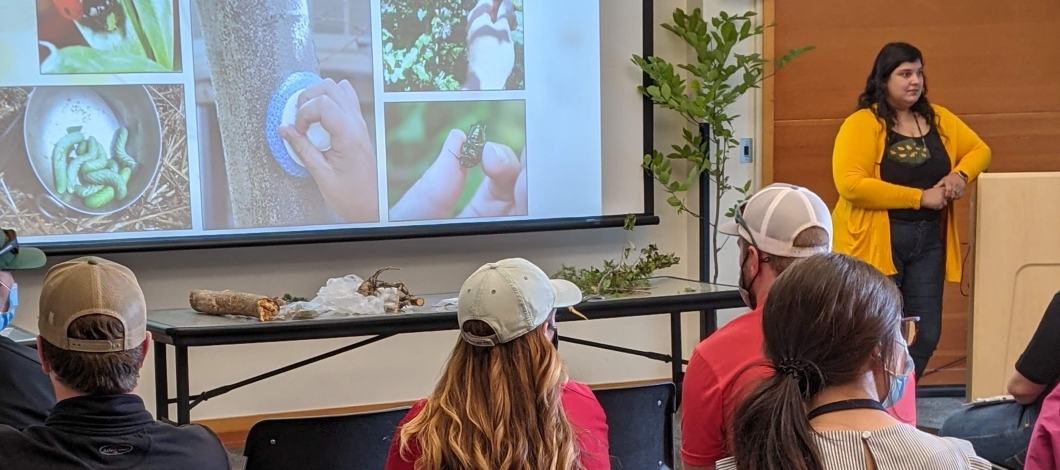Volunteering, Certification, and Continuing Education
Master Gardener Certification Requirements
The Extension Master Gardener Program is an eight to ten-week program. The course sections are taught by local Extension agents, plant professionals, MSU staff, and Mater Gardener volunteers. After completion of the Master Gardener Course, class participants will be expected to pass an open-book exam and fulfill a 20-hour volunteer commitment. After finishing the course work, passing the exam, and completing volunteer requirement, participants will be considered Extension Master Gardeners.
To become an Advanced Master Gardener, participants will be required to accumulate at least 100 hours of volunteer service hours or 2-5 years of continued service. 25 hours of continuing education over 2-5 years is also required. Those seeking Advanced Master Gardener status will need approval through their local extension agent and/or the Montana Master Gardener Coordinator.
"Master Gardener in Good Standing" - Maintaining Master Gardening Certification
Master Gardeners and Advanced Master Gardeners need to complete the following to maintain their active status in the Extension Master Gardener Program.
- Annually update their volunteer management system profile
- Accept the code of conduct
- Acquire 20 or more hours of volunteer service annually
- Obtain at least 4 hours of continuing education per year
Volunteer Categories with Descriptions
The following categories of services will be considered to meet the volunteer requirements for Master Gardener in Good Standing:
- Answering Questions - One-to-one questions answered by a volunteer. This can be either phone, email, or in person.
- Community Gardens - Community Gardens are gardens established in an area that target the surrounding community. The gardens are typically limited to those residents who work in the garden or are served by the garden. Master Gardener volunteers lead teaching efforts but work in the community garden is typically done by the community.
- Conference - Hosting a conference or symposium.
- Demonstration Gardens - Demonstration gardens are gardens that demonstrate specific plants or gardening techniques. These examples are used to teach the county population at large. Demonstration gardens are maintained by Master Gardener volunteers, and their primary purpose is for public education.
- Food Distribution/Food Bank - Work conducted that contributes to food distribution or food banks/pantries.
- Research Support - Working to collect samples for research being done by Montana State University.
- Media/Social Media/Web - Any support to educate on horticulture practices or advertise Master Gardener events. This includes taking pictures and write ups for social media or web posts. TV/Radio media are included in this category.
- Presentations/Teaching - Conducted as individuals or as a group, presentations are a way to maximize public education.
- Tables/Booths/Exhibits - Tables/Booths/Exhibits are set up in designated areas to answer generic questions for the public.
- Writing Articles/newsletters - Print and online publications.
- Youth - Any gardening educational event or activity in which youth are the primary audience.
- Supporting the Agent - Working in the extension office (making copies for master gardener trainings or putting packets together for a garden tour).
Continuing Education Units (CEUs)
What constitutes an approved training?
They must be factual and accurate, and come from a research-based source.
Training hours must be provided by extension professionals, university staff, extension sponsored seminars/workshops, Montana Department of Agriculture events, horticulture or plant sciences classes, or online trainings sponsored by a university.
For training not sponsored by these entities, approval by county extension agent or Master Gardener Coordinator will be required.
- Cultivating Healthy Plants Webinar series (live and recorded) https://www.cultivatinghealthyplants.org/
- MSU Urban IPM DigitalChalk Portal. Online IPM focused training
- Presentations by master garden groups (County agent needs to approve content)
- Turf to Trees workshop (MSU campus, Bozeman)
- Gardening in Montana trainings
- Diagnostic Boot Camp – Advanced Master Gardeners
- Community, horticulture focused presentations sponsored by local county extension (in-person or remote)
- Online horticulture based programming from universities
- Master Gardener Conferences (state and national)
- Presentations from green industry professionals (i.e., presentations at nurseries with county agent approval)
- Presentations from non-profits like The Native Plant Society, Audubon Society
What doesn’t count as approved training?
- Gardening sessions offered by entertainers, mass media, and salespeople
- Watching videos from commercial personalities that are not supported by a university system
- Listening to radio programs or watching television programs
- Visiting gardens

